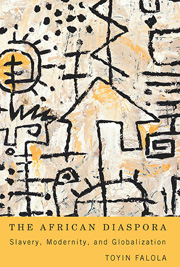Book contents
- Frontmatter
- Dedication
- Contents
- Preface and Acknowledgments
- Introduction: The Old and New African Diaspora
- Part 1 The Old Diaspora: Slavery and Identity Politics
- Part 2 An African Case Study: Yoruba Ethnicity in the Diaspora
- Part 3 The New Diaspora: Transnationalism and Globalization
- 8 Western Education and Transatlantic Connections
- 9 Africa in the Diaspora and the Diaspora in Africa: Toward an Integrated Body of Knowledge
- 10 Tanure Ojaide and Akin Ogundiran: Knowledge Circulation and the Diasporic Interface
- 11 Nollywood and the Creative World of Aderonke Adesola Adesanya: The African Impact on Global Cultures
- 12 Globalization and Contemporary Cultures
- Postscript: United States Foreign Policy on Africa in the Twenty-First Century
- Notes
- Bibliography
- Index
8 - Western Education and Transatlantic Connections
from Part 3 - The New Diaspora: Transnationalism and Globalization
Published online by Cambridge University Press: 05 September 2013
- Frontmatter
- Dedication
- Contents
- Preface and Acknowledgments
- Introduction: The Old and New African Diaspora
- Part 1 The Old Diaspora: Slavery and Identity Politics
- Part 2 An African Case Study: Yoruba Ethnicity in the Diaspora
- Part 3 The New Diaspora: Transnationalism and Globalization
- 8 Western Education and Transatlantic Connections
- 9 Africa in the Diaspora and the Diaspora in Africa: Toward an Integrated Body of Knowledge
- 10 Tanure Ojaide and Akin Ogundiran: Knowledge Circulation and the Diasporic Interface
- 11 Nollywood and the Creative World of Aderonke Adesola Adesanya: The African Impact on Global Cultures
- 12 Globalization and Contemporary Cultures
- Postscript: United States Foreign Policy on Africa in the Twenty-First Century
- Notes
- Bibliography
- Index
Summary
I want to start with an emerging set of data drawn from three valuable colleagues. The first is a Senegalese-born professor of computer science who teaches at Humboldt State University in a beautiful and heavily wooded part of California. Married to a Togolese woman of cosmopolitan background, their first language is the West African Fon, their second is French, and their third is English. They use Fon at home to structure family interactions and socialize their adorable children into their indigenous culture, they use French for correspondence with relations and friends in Africa, and they use English to earn a living in the West and to prepare their children for adult life. The couple started their education in the Republic of Benin, completed their graduate training in France, and moved to the United States for work.
The second is an American who specializes in the history of the American Northwest and who secured a Fulbright to teach at the University of Lagos in Nigeria. After a while he left, moving temporarily to South Africa before returning back home to the United States.
The third is a polyglot literary critic who started his education at Ile-Ife, Nigeria, where he received his first degree from the University of Ife in French and Portuguese, and later went on to the University of Wisconsin to earn his doctorate in Lusophone Africa. After teaching at Tulane and the University of Massachusetts at Amherst, he moved to the University of Texas at Austin where he is popularizing the study of Yoruba language, teaching Portuguese, and writing on Afro-Brazilians.
- Type
- Chapter
- Information
- The African DiasporaSlavery, Modernity, and Globalization, pp. 213 - 234Publisher: Boydell & BrewerPrint publication year: 2013



